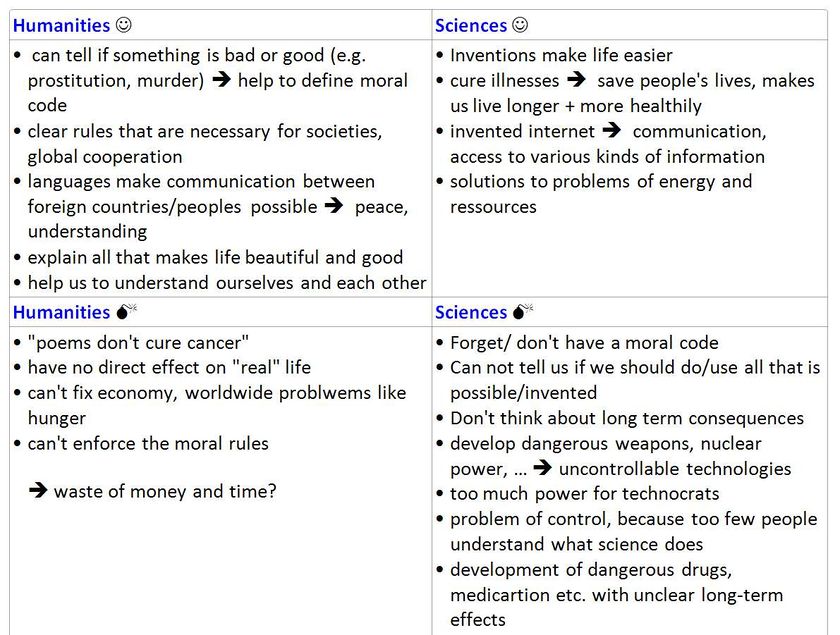Thelenberg 2013 14: Unterschied zwischen den Versionen
Aus RMG-Wiki
K (→Homework) |
K (→Homework) |
||
| Zeile 6: | Zeile 6: | ||
Short introduction, clear structure, effective phrases! | Short introduction, clear structure, effective phrases! | ||
| − | * What are the effects on our society, if Dr Verma | + | * What are the effects on our society, if Dr Verma is '''right''' with her opinion on the cause of the differences in male and female brain structure? What does it imply if she is '''wrong''' - and society and education are the causes? |
* Find examples for both alternatives and explain what you think to be right! | * Find examples for both alternatives and explain what you think to be right! | ||
Version vom 18. Dezember 2013, 02:06 Uhr
Inhaltsverzeichnis |
Homework
Prepare a three-minute-talk:
Short introduction, clear structure, effective phrases!
- What are the effects on our society, if Dr Verma is right with her opinion on the cause of the differences in male and female brain structure? What does it imply if she is wrong - and society and education are the causes?
- Find examples for both alternatives and explain what you think to be right!
Analyse and comment on the cartoon you find here!
.
Basic Skills & Information
- Writing a diary entry
- Information on homework and oral grades
- Reading and Marking technique - SQ3R Method A useful method to read, mark and annotate texts.
- Working with Cartoons
- A good speech/speaker ...
- Answering questions on the text
- Starting a paragraph
- Starting an Essay/Comment
- Writing an interview
- Mediation
- Translation (E→G)
- Characterization
- Diary
- Building an Argument
Science
Science vs. Humanities
Science vs. Humanities - Text-Summary
Summary for Text "Science vs. Humanities"
- only scientists make real contributions to humanity!
- division into sciences and humanities makes solving world's problems difficult
- many educated people have no understanding of basic concepts and the projects in modern physics
- contrasting positions:
- humanities give us understanding of history → learn from history → culture VS.
- poetry doesn't save lives etc. like e.g. medicine
- → true that humanities can't solve e.g. medical or technical problems, but they provide what science can't do: answers to moral/ethical questions (not necessarily in shape of organized religion!)
- philiosophy in the original sense included looking for answers to all questions (incl. natural. philosophy)
- science and humanities give different answers to different questions, but both help us master our lives
The Hobbit
The original idea was that of a "reading-diary". That meant
- keeping a simple log-/scrapbook while reading the novel
- stopping from time (at least after each chapter) to time to think about what you have read!
- thinking about questions like: "Is there anything that puzzles you?" and noting down questions or striking quotations!
- asking yourself if you like or dislike a character + what makes you feel so?
- making notes that you can add to (e.g. one page per character for characterization)!
The scrap book that you have to hand in is part of the coursework (marked!)
These are the minimum reqirements, that is the questions you need to have readable and reasonable NOTES on:
Chapters 1 and 2:
- Characterize Bilbo and one other character (round or flat, relation to each other?)!
- What kind of story and hero do you expect at the end of chapter one?
- Compare your impressions of Bilbo and the dwarves at the end of chapter II with those at the end of chapter I.
Chapters 4 + 5:
- p. 65-70: What rhetorical devices (e.g. symbols, style) and narrative tricks are used to create the special mood, tension and expectations?
- Collect all important information about goblins/orks in a "what travellers ought to know about goblins" profile!
- What are the similarities and differences between Bilbo and Gollum? (NOTES)
Chapters 7 + 8:
- Characterize Beorn!
- How does the mood / atmosphere develop from page 158 – 162 … How is this effect achieved?
- Explain how chapter 8 reveals Bilbo's heroic qualities!
- Compare the different dwarves' (Bombur - Thorin - Kili&Fili) and Bilbo's roles/function in the story in chapter 8! Who are the flat and who the round characters?
Chapters 9 + 10:
Compare the endings of chapters 8, 9 and ten.
Chapters 11 + 12:
- Characterize Smaug (NOTES!)
Chapters 14 + 15:
- Characterize Bard
- How can Thorin's reaction to Bard's requests be explained?
Chapters 16 + 17:
- Bilbo fully turns into a modern, everyman anti-hero - very different from an epic hero like Thorin.
- Compare the two types of heroes!
- How do they feel abot the treasure / fighting?
- What does "honour" mean for them?
Chapters 18 + 19:
- Sum up what Bilbo has lost and gained in the end!
- What do you think of Bilbo's development throughout the book and what does it tell the reader?


